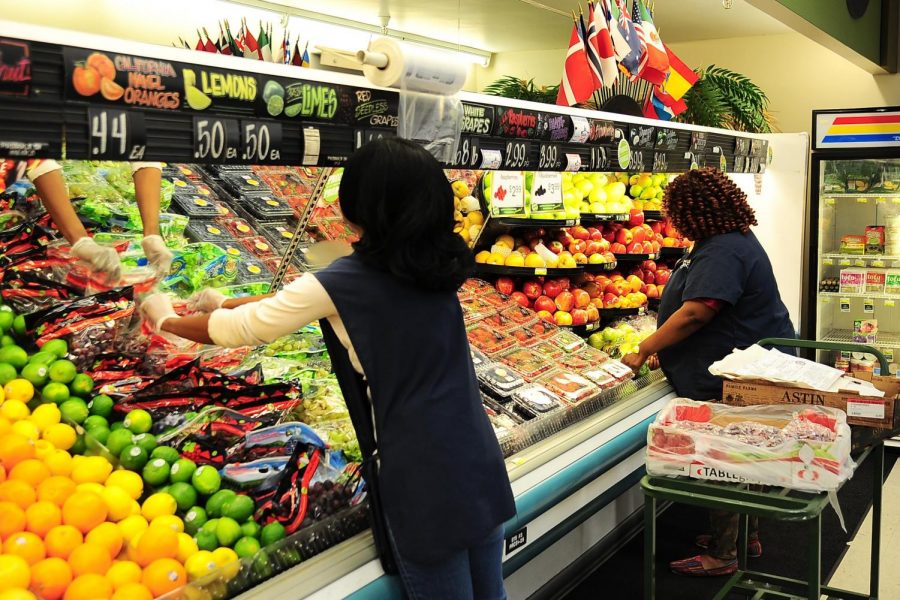Co-op food markets have no home in Boston
Cooperative food markets have had an unsuccessful run in Boston. Most residents fulfill their grocery needs by shopping at major grocery stores like Stop & Shop, Whole Foods and Target.
March 13, 2019
After months of declining revenues and increasing debt, Harvest Co-op Markets has closed both of its Boston locations, bringing an end to nearly 50 years of business. Following Harvest’s closure, there are no longer any cooperative style food markets in the city of Boston.
Broadly speaking, cooperative, or co-op businesses differ from traditional ones because they are owned by the people who use their services. Shoppers, often referred to as members, run the business to benefit members instead of earning profits. Co-ops also aim to better their communities, support other co-ops and act sustainably.
Co-ops come in many forms and are present in many industries. According to National Co-op Grocers, the first co-ops in the United States were formed in rural, agricultural parts of the Midwest. These early businesses became popular in the late 19th century and aimed to help farmers make more money when selling their crops. In the 1970s, during the “third wave” of co-op popularity, co-ops providing housing, groceries, health care and financial services became available to consumers.
Harvest was one of these third wave co-ops, and began as a buying club on Boston University’s campus in 1971. Most co-ops formed during this era didn’t last due to insufficient cash flow and membership. Harvest, until very recently, avoided those problems and thrived.
The market claims it was “literally too crowded to shop” by 1974 and managers were forced to close off membership for a year. This growth continued until recently; prior to closing, Harvest claimed to have had around 3,000 members. But the market couldn’t keep this momentum going.
The co-op reported large losses in its Jamaica Plain and Cambridge locations for many months prior to shutting down. Deb Mel, a board member of the Greater Boston Chamber of Co-ops, said that “by the time alarm bells were going off, the [financial] losses were already too high.”
To some, co-ops like Harvest are valuable because they reduce costs. At Harvest, costs were kept low replacing paid staff with volunteers. This reduced the cost of labor, making Harvest’s goods much cheaper.
In addition to lower prices, a Harvest membership guaranteed other benefits. According to its website, Harvest offered monthly “discount days,” access to special order items, discounts for buying in bulk and yearly dividends when the market made a profit. Harvest also offered some unique products. One customer commented, “I really enjoyed the bulk section … they had great prices on equal-exchange coffee too.”
Harvest’s benefits, many of which are common across the co-op industry, are one of the reasons that co-ops have grown in popularity. The Democracy at Work Institute estimates the United States is currently home to over 300 cooperative businesses, a figure which has grown steadily over the last 20 years. Why, then, is Boston no longer a part of this market?
In Boston, most people can fulfill their grocery needs by shopping at major grocery stores like Stop & Shop, Whole Foods and Target. For a long time, Harvest had been able to provide exotic, specialty foods that major retailers wouldn’t carry. But over time, these large retailers increased their variety, and as Northeastern professor Chris Bosso, an expert in urban studies and food systems, explained, “Harvest didn’t fill a niche anymore.”
Bosso also noted the economic challenges of operating a co-op in the Boston area, and that Harvest was able to stay in business mainly because volunteering kept labor costs low. However, as the cost of living rose in Boston, people became less and less willing to give up their free time to volunteer at Harvest, forcing the co-op to hire paid staff. This reduced Harvest’s already slim profit margin and ultimately led to its closure.
Despite this, Bosso doesn’t feel that this marks the end of co-ops in Boston, adding, “It’s not that people don’t believe in the value of cooperatives, it’s that the economics don’t make sense.”


















